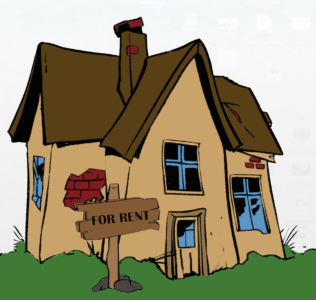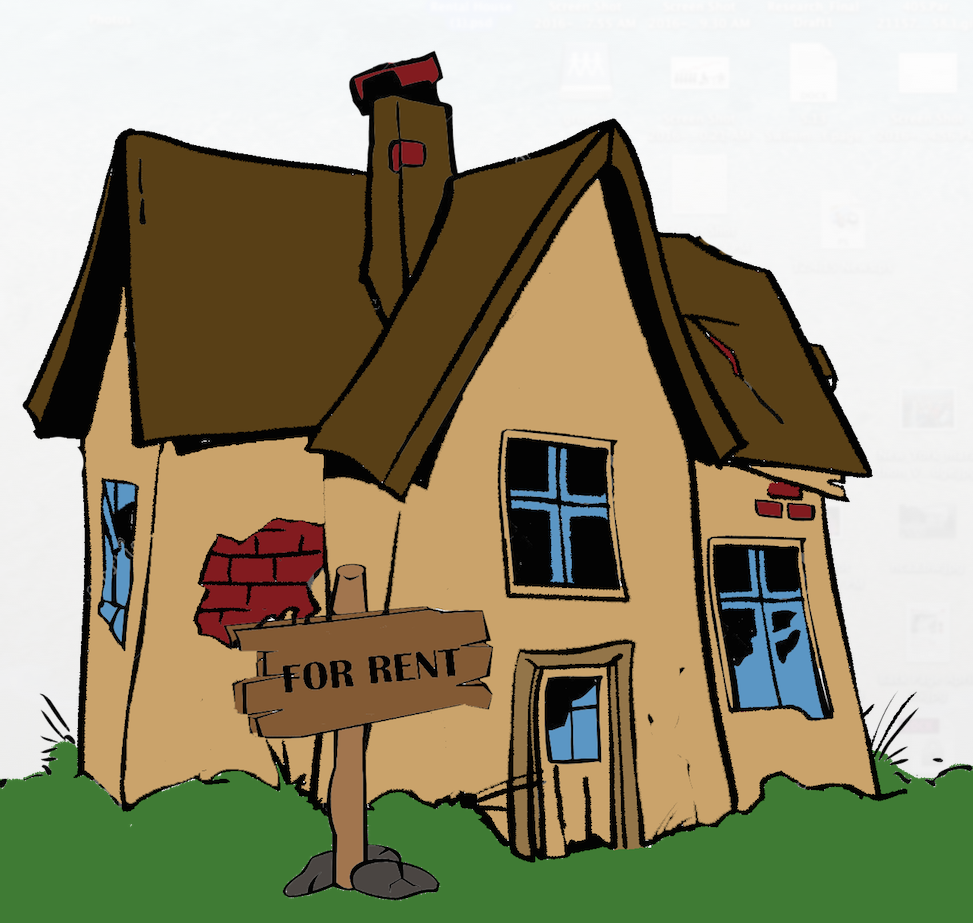
By Zane Silk
silkzane@grinnell.edu
In October 2013, when Duane Neff inspected 1217 Fifth Ave., he was met by a welcoming committee of cockroaches and leaky pipes had forced the water to be shut off for more than three days. The house ranks among the top five worst Neff has seen — even after 35 years of experience inspecting homes, and the house has not changed since. Because Grinnell tenants deal with problems like this and more, the City of Grinnell is attempting to propose a rental inspection program for the second time in five years.
In 2011, the City’s Planning Committee first considered an inspection program, which would have required all rental properties to be inspected annually at a cost of 50 dollars to the landlord.
“We proposed an ordinance, took it to committee. … it never went to council, because through the committee, landlords basically were the ones who were at the meetings, spoke against it, and so at the time, the council determined not to do anything,” said Neff, who serves as the Director of Building and Planning and authored the 2011 proposal.
In Iowa, only municipalities with over 15,000 people must have a rental inspection program, exempting Grinnell despite the city’s housing stock being 36.8 percent rental properties, nearly 25 percent higher than the state as a whole. Currently, the City can only order inspections on the basis of a complaint from the tenants or owners, or in rare cases, by getting a search warrant, and either Neff or his assistant conducts them.
“We usually get, I’d say an average of, it’s not very many, four or five [complaints from tenants annually], and usually it’s when college students’ parents come to either move them in or move them out and they see the condition of what their son or daughter has rented,” Neff said.
Neff cites his October 2013 inspection of 1217 Fifth Ave. as the main motivation for re-launching the rental inspection initiative.
“The day that we went in there, there were two tenants for the eight units in there. The water had been turned off for the three days prior to that because of so many leaks. There were electrical issues, they were having heating issues, cooling issues, rodent issues,” Neff said. “Lots and lots of cockroaches. … Light fixtures were broken. The plaster was all cracked and falling off.”
Following the inspection and relocation of the tenants and a year and half of negotiations between lawyers, property owner Dave Seaba agreed that by the end of 2016 he would do one of three things: sell the house, fix all of the issues and get the house up to code or demolish it. Currently, no action has been taken and the property remains as it has for the past three years, boarded up and empty.
The long, drawn out case of 1217 Fifth Ave. eventually led to concrete steps towards a new proposal during the City Council’s annual retreat earlier this year.
“At their meeting they decided they felt like rental inspection was on of the top priorities they wanted to look at,” Neff said.
The idea caught on to convene an independent taskforce to review the 2011 proposal and to create a new proposal for the council to vote on. Most likely, the council will vote on Oct. 3 on whether to convene the taskforce, which would be composed of City staff, tenants, landlords and ordinary citizens. If approved, Neff thinks the taskforce will have a final proposal by March 2017, and he hopes the taskforce will help reduce opposition relative to 2011.
Unfortunately for Neff, some of the old opposition is not budging, including Seth Rozendaal who, together with his parents Bill and Norma Rozendaal, owns and manages a number of rental properties in Grinnell.
“This is kind of how the government works. When they don’t have the support to get something through, they’ll just try over and over and over until finally it passes,” Rozendaal said, who distrusts the City because of issues like the Iowa Museum of Transportation’s foreclosure last year. “You get a worse service at a higher cost whenever you do a government thing versus [private companies].”
A major point of concern for Rozendaal is the cost of the program, especially given his view that the rental inspection program would require a new fulltime inspector. However, Neff is adamant that there would be no new hires.
“It’s going to be tough, I understand that, it’s not like I don’t have anything else to do, but we’ll get through it,” Neff said.
Grinnell has approximately 1,300 rental housing units, according to The American Community Survey, meaning that inspecting the whole rental stock in a year would require roughly five inspections each business day. Neff conceded that, without any new staff, the first round of inspections might take more than a year.
According to Rozendaal, landlords are not alone in their opposition as many of their tenants do not want to shoulder the burden of the costs either.
“I think a lot of the tenants themselves are against it, just because of these costs that are associated with it, first of all they’ll never go away, they never go down and they always go up, and they always get pushed out on to the end user, which, in this case, is the tenant,” he said.
One tenant who supports the program is Louis Engleman ’17, who lives with a few housemates in a house on High St. that has been occupied by Grinnell students going back several years. After moving in June 1, Engleman received a water bill for June 10 through Aug. 9 of 740 dollars, much of which he believes is due to a leaky toilet.
“This problem supposedly started just about a week after our landlord did a walkthrough the house,” Engleman said. “And if it started that soon after, … we think she didn’t do a good enough job examining the place.”
“I knew the tenants that lived here last year, and that toilet was an issue. … It had to be fixed multiple times,” said Rebekah Rennick ’18, a friend of Engleman’s who said that his landlord had a responsibility to inform him and his housemates of those issues so they could watch for it.
At the time The S&B went to print, Engleman’s landlord agreed to pay 200 dollars of the bill. Engleman believes that City-recognized inspectors would likely have had the leaky toilet fixed, saving him and his housemates a hefty water bill.
























































